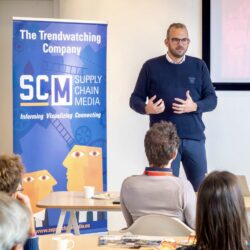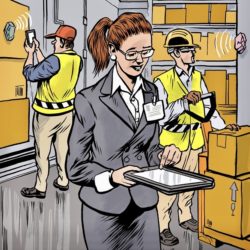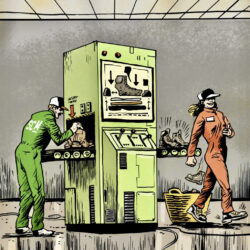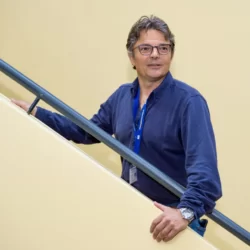Quooker puts Stephen Covey’s lessons into practice

Over the past 20 years, Quooker has consistently managed to double its sales every three years. During a company visit by the SCM Directors Club Netherlands, Chief Supply Chain Officer Michiel van Veen (pictured) explained how he intends to continue supporting that rate of growth in the future. In his supply chain vision, he has drawn inspiration from the lessons of management guru Stephen Covey. ‘By achieving a victory over yourself, you can achieve a victory with others.’
By Marcel te Lindert
During a tour of the factory in the town of Ridderkerk, it becomes clear to everyone that Quooker aspires to product leadership. The producer of boiling-water taps – which can now also provide chilled and sparkling water on tap – has such an innovative product that it has set up its own team of 30 engineers to design and control the necessary machinery. The importance of product quality is underlined by all the data recorded during the production process. If any problems arise with a tap, Quooker can use that data to analyse the cause and prevent future problems.
Supply chain vision
Michiel van Veen was appointed Chief Supply Chain Officer of Quooker almost three years ago. Due to the high-tech nature of the factory, he is responsible for procurement, logistics, demand planning, supply planning and production planning, among others, but not for the production process itself. ‘My colleague, the Chief Technical Officer, is responsible for both production and quality. This has allowed us to design almost half of the machines in the factory ourselves. I don’t have the technical background for that,’ admits Van Veen.
When Van Veen started at Quooker, the company lacked a vision on the role of the supply chain. However, the management of the fast-growing company did recognize the need for more coordination in the chain. Van Veen developed a vision that focused on creating customer value through a digital, responsive supply chain. And based on the realization that the world does not revolve around Quooker, but that Quooker is part of an extensive network in which some things are beyond its control.
Seven habits
 When fleshing out this vision, Van Veen drew inspiration from Stephen Covey, author of the bestseller ‘The Seven Habits of Highly Effective People’. ‘He has been my hero for the past 15 years. I have devoured his books and attended several training courses,’ states Van Veen, who adds that he always has a stack of copies of Covey’s bestseller on his desk. He hands them out to whoever wants them, and regularly organizes ‘Pizza with Covey’ training sessions for Quooker employees. ‘You need all of Covey’s seven habits to become a master of yourself. The underlying idea is that by achieving a victory over yourself, you can achieve a victory with others.’
When fleshing out this vision, Van Veen drew inspiration from Stephen Covey, author of the bestseller ‘The Seven Habits of Highly Effective People’. ‘He has been my hero for the past 15 years. I have devoured his books and attended several training courses,’ states Van Veen, who adds that he always has a stack of copies of Covey’s bestseller on his desk. He hands them out to whoever wants them, and regularly organizes ‘Pizza with Covey’ training sessions for Quooker employees. ‘You need all of Covey’s seven habits to become a master of yourself. The underlying idea is that by achieving a victory over yourself, you can achieve a victory with others.’
Van Veen has applied Covey’s seven habits to supply chain management. The first habit relates to a proactive attitude, which Van Veen describes as ‘unified mindset’. ‘If you don’t all have the right mindset, you won’t progress as an organization. That’s why I am extremely generous in offering training and education to people. I encourage people to make use of them. I regularly talk to young talents about their future CV: what do they want to do in the future, and what step do they need to take now to achieve it? That gives them energy and creates commitment.’
Quooker Parts Factory
As the second point, Covey advises keeping the end goal in mind in everything. ‘That is obviously about strategy,’ Van Veen says. ‘Think about the geopolitical turmoil right now. We have 28 suppliers in China and Taiwan. From the supervisory board, we get asked what we will do if tensions between those countries rise further. Reshoring is actually not an option. Most suppliers make unique parts, often with machines we put there. It would take years to achieve the same level of quality with other suppliers. That’s why we want to build our own Quooker Parts Factory in Europe: our own second source. An additional advantage is that we will be much closer to production and can therefore give an enormous boost to our R&D process. I call that rightshoring instead of reshoring.’
The third point deals with processes. ‘As far as I am concerned, that is mainly about data. We are in the process of setting up a kind of data carrousel in our IT landscape where all applications place their data on the carrousel and retrieve what they need from it. An integrated approach, in which we also store data in a structured way, is a prerequisite for the successful deployment of artificial intelligence, for instance. For that, the basics have to be in place.’
Robots as colleagues
 With the term ‘intelligent supply chain’ – the fourth habit – Van Veen refers to the deployment of new technologies such as mobile robots, cobots and vision technology. ‘In the factory, for example, there are 360-degree cameras in various places. If they see an empty stock location along the production line, a robot is automatically instructed to replenish that stock location,’ says the Chief Supply Chain Officer. ‘In the new warehouse we are currently building, 60% of the work will soon be done by robots. That is why we are already teaching our logistics staff to work with robots. They must learn to see those robots not as competitors, but as colleagues.’
With the term ‘intelligent supply chain’ – the fourth habit – Van Veen refers to the deployment of new technologies such as mobile robots, cobots and vision technology. ‘In the factory, for example, there are 360-degree cameras in various places. If they see an empty stock location along the production line, a robot is automatically instructed to replenish that stock location,’ says the Chief Supply Chain Officer. ‘In the new warehouse we are currently building, 60% of the work will soon be done by robots. That is why we are already teaching our logistics staff to work with robots. They must learn to see those robots not as competitors, but as colleagues.’
Covey’s fifth point, connected supply chain, is mainly about listening. ‘Listening well is difficult. That is why we have divided our procurement staff into product categories, so that they can build product expertise and act as regular points of contact for our suppliers. That way, we try to create more intimacy in the relationship with our suppliers. With strategic suppliers, we have weekly consultations on the current status and the latest developments,’ continues Van Veen, who also says he prefers to keep supplier contracts as short as possible. ‘We try to minimize risks through good relationships with suppliers rather than through contracts.’
Super-simple savings
Covey’s sixth habit is about creating synergy. Van Veen talks about sharing the profit. ‘This is about building long-term relationships with partners we believe in. By creating stronger connections with partners and learning to look at things holistically, we can achieve super-simple savings,’ says Van Veen, who has applied the seventh habit as social chain. ‘We work closely with Confed, a company with 135 employees who are marginalized in the labour market. Of these, 117 work solely for Quooker. We outsource whatever we can to them. That way, we try to do something good for society.’










